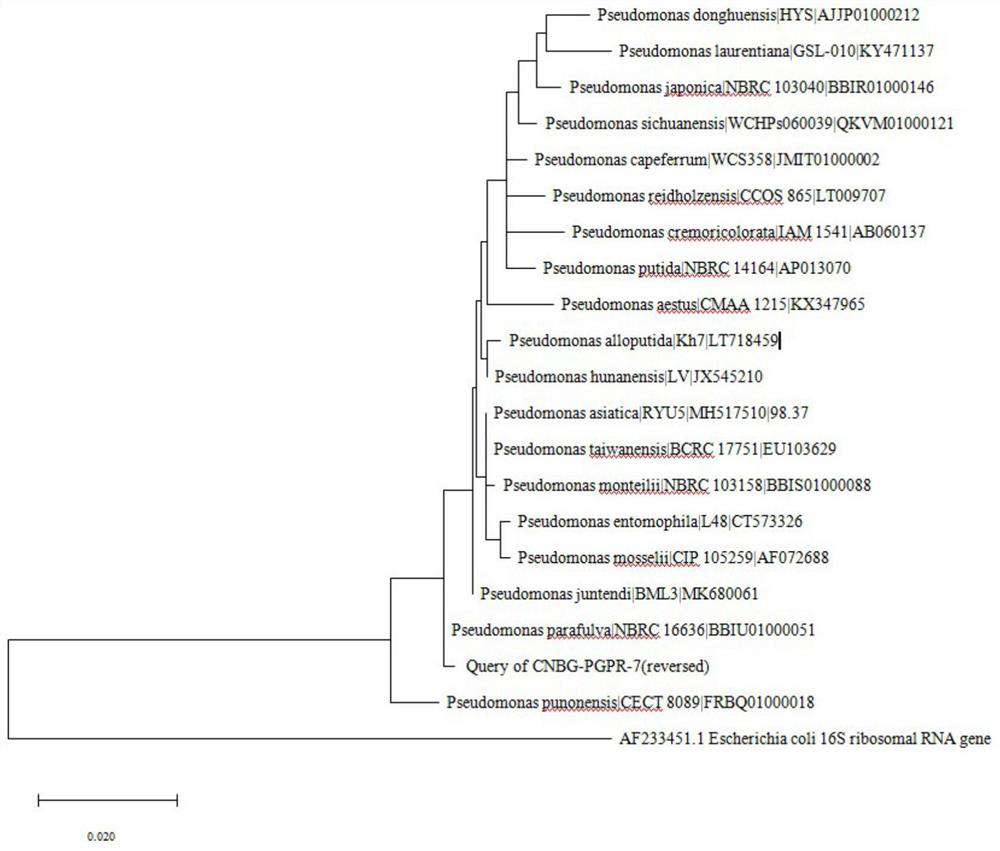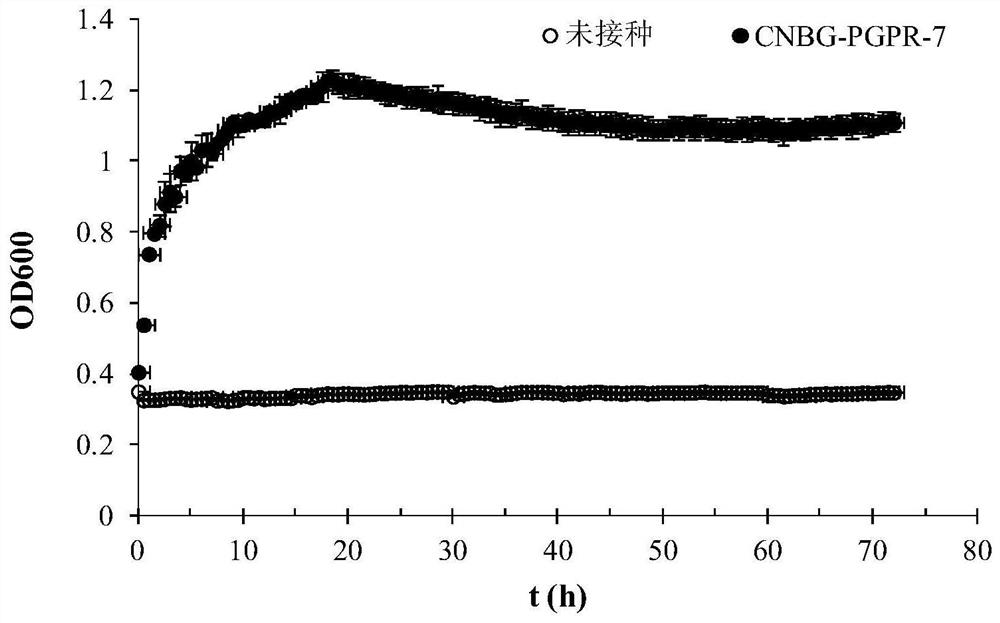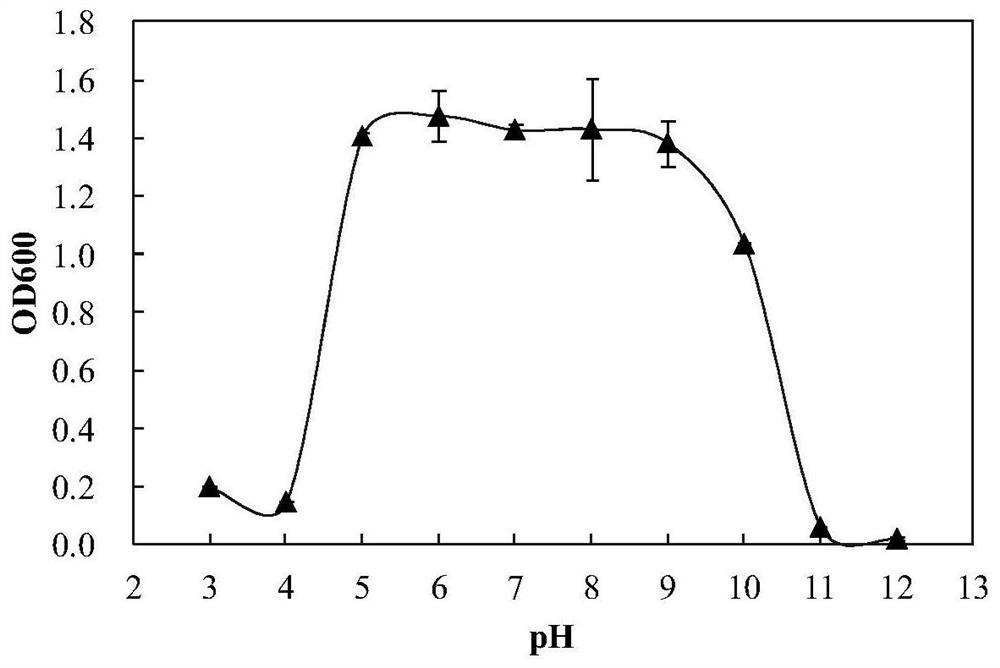A Strain of Pseudomonas Paraxanthomonas and Its Application
A technology of pseudomonas and microbial strains, which is applied to Pseudomonas paraxanthinum and its application fields in plant growth promotion and soil heavy metal pollution prevention and control, can solve problems such as few reports of pseudomonas, and achieves The effect of improving repair efficiency, promoting plant growth, and increasing tolerance
- Summary
- Abstract
- Description
- Claims
- Application Information
AI Technical Summary
Problems solved by technology
Method used
Image
Examples
Embodiment 1
[0025] Example 1 Isolation and Identification of Pseudomonas Paraxanthomonas CNBG-PGPR-7
[0026] (1) Culture medium composition:
[0027] Nutrient Agar (NA) medium: peptone 10g, beef extract powder 3g, sodium chloride 5g, agar 15g, distilled water 1L.
[0028] (2) Sample dilution and coating
[0029] Take 0.5g soil sample (collected from the farmland around the Nanjing mining area in Jiangsu Province) and suspend and shake in 4.5mL sterile saline, which is 10 -1 Gradient (ten-fold dilution), take 0.5mL from the dilution and suspend and shake in 4.5mL sterile normal saline, which is 10 -2 Gradient (100-fold dilution), and so on until diluted to 10 -6 gradient. Draw 100 μL from the dilutions of the 6 dilution gradients, spread them on the Nutrient Agar (NA) solid medium plate, prepare 2 copies in parallel, invert them, and culture them in a constant temperature incubator at 30°C for 24-36 hours, observe from time to time .
[0030] (3) Strain isolation and purification
...
Embodiment 2
[0052] Physiological characteristics of embodiment 2 bacterial strains
[0053] The medium used in this example is Nutrient Broth (NB) medium. The composition of NB medium is: peptone 10g, beef extract powder 3g, sodium chloride 5g, distilled water 1L.
[0054] (1) Growth curve
[0055] Take out the single colony of the strain CNBG-PGPR-7 picked from the solid medium plate and transfer it into the above NB liquid medium for activation, then activate the 2nd generation with 5% inoculum amount, and finally insert the 4th generation NB liquid with 5% inoculum amount In the culture medium, place it on an automatic growth curve analyzer at 30°C for continuous culture for 72 hours, and record the OD600 value every 0.5 hours. The growth curve of Pseudomonas paraxanthomonas CNBG-PGPR-7 is shown in figure 2 , the strain can enter the mid-logarithmic growth phase at about 5.0h, the OD600 value is 1.00, and then the growth rate slows down, and reaches the early stage of stabilization...
Embodiment 3
[0060] Example 3 Evaluation of related indicators of bacterial strain growth-promoting ability
[0061] (1) Nitrogen fixation capacity
[0062] Ashby nitrogen-free solid medium: glucose 10g, potassium dihydrogen phosphate 0.2g, magnesium sulfate heptahydrate 0.2g, sodium chloride 0.2g, calcium sulfate dihydrate 0.1g, calcium carbonate 5g, agar 20g, distilled water 1000mL.
[0063] Pick a single colony from the NA solid medium plate and inoculate it on Ashby nitrogen-free solid medium. Plate streaking method: Divide the Ashby nitrogen-free medium into three areas I, II, and III; pick a single colony from the NA solid medium, and perform zigzag streaking in the I area of the Ashby nitrogen-free medium; Dip the bacterial solution from the zone, and make a zigzag streak in the II zone of the Ashby nitrogen-free medium; dip in the bacterial fluid from the II zone, and perform a zigzag streak in the III zone of the Ashby nitrogen-free medium. The inoculated Ashby nitrogen-free s...
PUM
 Login to View More
Login to View More Abstract
Description
Claims
Application Information
 Login to View More
Login to View More - R&D
- Intellectual Property
- Life Sciences
- Materials
- Tech Scout
- Unparalleled Data Quality
- Higher Quality Content
- 60% Fewer Hallucinations
Browse by: Latest US Patents, China's latest patents, Technical Efficacy Thesaurus, Application Domain, Technology Topic, Popular Technical Reports.
© 2025 PatSnap. All rights reserved.Legal|Privacy policy|Modern Slavery Act Transparency Statement|Sitemap|About US| Contact US: help@patsnap.com



